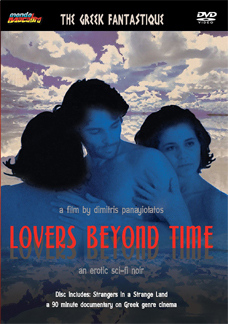 LOVERS
BEYOND TIME (1990)
LOVERS
BEYOND TIME (1990)Director: Dimitris Panayiotatos
Mondo Macabro
 LOVERS
BEYOND TIME (1990)
LOVERS
BEYOND TIME (1990)Nude time-traveling turns erotic with the Greek 1990s fantasy LOVERS BEYOND TIME, on DVD from Mondo Macabro.
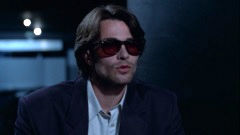
Feeling drained by the intensity of her relationship with brooding scientist Angelos (Benoit Roussel), music producer Sylvia (Christine Skaza) breaks up with him dinner in public, although that does not stop him from making a scene by driving a butter knife through his own hand before coercing her to some not entirely nonconsensual hanky panky in the restroom. When Sylvia reiterates her decision to leave Angelos after he attempts to give her a tape of music by unknown composer Zinos Flerianos, he promises her that her life will unravel like the tape and that one day she will return to him. Three years later, Sylvia is married to mild-mannered doctor Mihalis (Takis Moschos) – who has been visited by Angelos who his suffering from an illness that he believes has been caused by the breakup and holds those behind it responsible – when her boss is insistent that she track down mysterious but hot young talent Flerianos. Her memories of Angelos resurface in an unexpected manner as starts experiencing the sensations of being made love to by an invisible partner. Naturally, her erratic behavior starts to alienate her husband who turns to the arms of Sylvia's wheelchair bound best friend Cleo (Nantia Deliyanni) who subsequently vanishes after Sylvia discovers them in bed. Sylvia suspects that Angelos might be responsible when she sees him at a concert series in which Flerianos was supposed to appear, but she and her husband are puzzled to discover not only did Angelos disappear some time ago but the police also tell them that Cleo has also been dead for the last two years. Is Angelos haunting Sylvia from beyond the grave, and is her husband his next target?
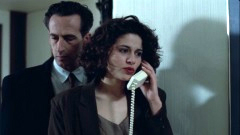 With
little cultural support for genre cinema in Greece – apart from comedies
and the brief boom of softcore and hardcore sexploitation films in the seventies
– LOVERS BEYOND TIME is rare example of a homegrown Greek genre film along
with George Lazopoulos' MEDOUSA (on DVD from Mondo Macabro) and Nico Mastorakis'
ISLAND OF DEATH, with the country usually used as a scenic backdrop for foreign
productions like Richard Jefferies' BLOOD TIDE, Costas Carayiannis' British-financed
THE DEVIL'S MEN, and Gordon Hessler's MEDUSA. It is a little hard to determine
where the film's sympathies lie, as one can hardly blame Sylvia for dumping
Angelos; and the whole storyline of emotional and psychological (not to mention
"physical" if seemingly telepathic) manipulation of a character who
needs to be lead back around to the notion of true love also seems more than
a bit offensive. That said, it is not the more fantastical twists of the third
act that are compelling so much as the philosophic idea of love as "unified
time" and time figuratively standing still for the one left behind in the
break-up, as well as the climax in which Sylvia's only shot at future happiness
means that she must literally learn to live with who she once was as a reminder
of everything she has lost. Although produced on a low budget, the film has
a slick look somewhere between eighties music video and 1990s direct-to-video
erotic thriller.
With
little cultural support for genre cinema in Greece – apart from comedies
and the brief boom of softcore and hardcore sexploitation films in the seventies
– LOVERS BEYOND TIME is rare example of a homegrown Greek genre film along
with George Lazopoulos' MEDOUSA (on DVD from Mondo Macabro) and Nico Mastorakis'
ISLAND OF DEATH, with the country usually used as a scenic backdrop for foreign
productions like Richard Jefferies' BLOOD TIDE, Costas Carayiannis' British-financed
THE DEVIL'S MEN, and Gordon Hessler's MEDUSA. It is a little hard to determine
where the film's sympathies lie, as one can hardly blame Sylvia for dumping
Angelos; and the whole storyline of emotional and psychological (not to mention
"physical" if seemingly telepathic) manipulation of a character who
needs to be lead back around to the notion of true love also seems more than
a bit offensive. That said, it is not the more fantastical twists of the third
act that are compelling so much as the philosophic idea of love as "unified
time" and time figuratively standing still for the one left behind in the
break-up, as well as the climax in which Sylvia's only shot at future happiness
means that she must literally learn to live with who she once was as a reminder
of everything she has lost. Although produced on a low budget, the film has
a slick look somewhere between eighties music video and 1990s direct-to-video
erotic thriller.
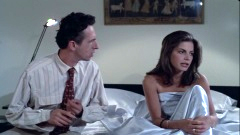
Unreleased in the United States previously, and only on home video and DVD in Greece prior to this, Mondo Macabro's progressive, anamorphic 1.78:1 widescreen DVD comes from an older master with uneven blacks, occasional noise in the saturated gel lighting, and fair detail; although it looks superior to Mondo Macabro's other Greek exploitation films just by virtue of being a newer production. The presentation is more than satisfactory, but it seems doubtful that any vintage Greek exploitation will be seeing Blu-ray anytime soon here or abroad. The Dolby Digital 2.0 mono track gets the job done with clear dialogue (possibly post-synched) and music while the optional English subtitles are free of any glaring errors.
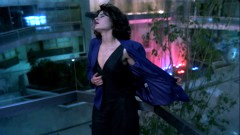 While
the film is brief at just under eighty minutes, the DVD is packed with extras,
starting with director Dimitris Panayiotatos' own 2009 documentary on Greek
genre cinema "Strangers in a Strange Land" (96:18) which starts with
the popularity of mystery genre, divided into detective films like CRIME IN
KOLONAKI told from the perspective of the detective, thrillers like FEAR told
from the perspective of the criminal and shedding light on their sociopolitical
realities, and suspense films told from the perspective of the victim like DOUBTS
followed by crosspollination of the three modeled on PSYCHO with shifting perspectives,
as well as the influence of the giallo with 1970s exploitation films like THE
HOOK. Noir was another genre that appealed to Greek filmmakers from THE HOT
MONTH OF AUGUST in 1966 to more modern takes like U-TURN (1991) and TIME TO
KILL (1993) among others. Fantasy cinema was rarer with one Greek critic in
the documentary not believing that THE DEVIL'SMEN (aka LAND OF THE MINOTAUR)
existed until its late in the eighties, modern explorations of myth with the
aforementioned MEDOUSA or the Greek stab at folk horror SCARS OF THE NIGHT,
or the post-28 DAYS LATER/DAWN OF THE DEAD remake zombie film EVIL (which actually
found international distribution), the "cult classic" DRACULA OF EXARCHEIA,
and the near-unclassifiable noirish/gothic/sexploitation film SINGAPORE SING
(on DVD from Mondo Macabro). Discussion of LOVERS BEYOND TIME dovetails to an
exploration of genre television since Panayiotatos was responsible for two series
TALES OF LOVE AND HORROR in 1989 and MAGIC NIGHT in 1995, the latter consisting
of adaptations including 4-SIDED TRIANGLE (previously adapted by Hammer). The
last section focuses on video filmmakers, with critics noting more support for
the genre in this medium with many of the filmmakers learning from other films
and free of film school ideologies. In 2007, critic Dimitris Koliodimos –
who is interviewed here – published an article on "The Greek Fantastique"
in Video Watchdog, and this documentary should prove just as essential
a starting point in exploring what Greek genre cinema has to offer.
While
the film is brief at just under eighty minutes, the DVD is packed with extras,
starting with director Dimitris Panayiotatos' own 2009 documentary on Greek
genre cinema "Strangers in a Strange Land" (96:18) which starts with
the popularity of mystery genre, divided into detective films like CRIME IN
KOLONAKI told from the perspective of the detective, thrillers like FEAR told
from the perspective of the criminal and shedding light on their sociopolitical
realities, and suspense films told from the perspective of the victim like DOUBTS
followed by crosspollination of the three modeled on PSYCHO with shifting perspectives,
as well as the influence of the giallo with 1970s exploitation films like THE
HOOK. Noir was another genre that appealed to Greek filmmakers from THE HOT
MONTH OF AUGUST in 1966 to more modern takes like U-TURN (1991) and TIME TO
KILL (1993) among others. Fantasy cinema was rarer with one Greek critic in
the documentary not believing that THE DEVIL'SMEN (aka LAND OF THE MINOTAUR)
existed until its late in the eighties, modern explorations of myth with the
aforementioned MEDOUSA or the Greek stab at folk horror SCARS OF THE NIGHT,
or the post-28 DAYS LATER/DAWN OF THE DEAD remake zombie film EVIL (which actually
found international distribution), the "cult classic" DRACULA OF EXARCHEIA,
and the near-unclassifiable noirish/gothic/sexploitation film SINGAPORE SING
(on DVD from Mondo Macabro). Discussion of LOVERS BEYOND TIME dovetails to an
exploration of genre television since Panayiotatos was responsible for two series
TALES OF LOVE AND HORROR in 1989 and MAGIC NIGHT in 1995, the latter consisting
of adaptations including 4-SIDED TRIANGLE (previously adapted by Hammer). The
last section focuses on video filmmakers, with critics noting more support for
the genre in this medium with many of the filmmakers learning from other films
and free of film school ideologies. In 2007, critic Dimitris Koliodimos –
who is interviewed here – published an article on "The Greek Fantastique"
in Video Watchdog, and this documentary should prove just as essential
a starting point in exploring what Greek genre cinema has to offer.
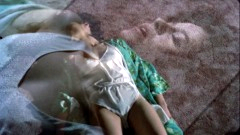
"The Fantastic... The Erotic" (25:21) is a video interview with Panayiotatos who recalls his interest in comics and genre cinema from a young age before following the family career path of studying law. He jumped at the opportunity to study art and film in Paris where he became familiar with the midi-minuit crowd and directed his first film with his professor Denis Levy titled L'USINE DU VAMPIRE, a political take on the Dracula mythos with the vampire running a factory and feeding off the female staff, and collaborating on books with Greek author and film critic Ado Kyrou. He returned to Greece to work in television under Z author Vasilis Vasilikos. He then discusses his first film as a solo director and his first Greek film NIGHT WITH SILENA which was a semi-autobiographical exploration of a man who becomes obsessed with a woman he spies on through a telescope and casts her in his fantasies. He then mounted the six-episode TALES OF LOVE AND HORROR, four episodes of which were more recently compiled into the video release DEADLY CASTING, and then the later twenty-four episode series MAGIC NIGHT. Of LOVERS BEYOND TIME, he recalls the influence of BACK TO THE FUTURE and his idea of an erotic spin on it while also drawing from Philip K. Dick, and the opportunity he got to show the film at Avoriaz in the company of Dario Argento, George Romero, among others.
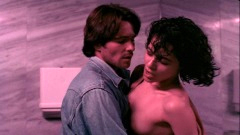 The
TALES OF LOVE AND HORROR episode "The Last Meal" (26:58) is presented
in its entirety here. Hosted onscreen by actor Moschos, it is the story of a
dating couple's visit to a very exclusive restaurant with only one specialty,
described by the maître d' as an exotic species of goat from Afghanistan.
When one of the pair is given the exclusive invitation to visit the kitchen
and never returns, the other decides makes an ill-advised return to the restaurant
and discovers the true nature of the specialty of the house. There is nothing
surprising about the plot (it's been done by Hitchcock and others), but Panayiotatos'
treatment of the story is assured and moves it towards a resolution appropriate
to the overall title of the series. The film's theatrical trailer (2:34) is
included along with usual "More from Mondo Macabro" promo reel.
(Eric Cotenas)
The
TALES OF LOVE AND HORROR episode "The Last Meal" (26:58) is presented
in its entirety here. Hosted onscreen by actor Moschos, it is the story of a
dating couple's visit to a very exclusive restaurant with only one specialty,
described by the maître d' as an exotic species of goat from Afghanistan.
When one of the pair is given the exclusive invitation to visit the kitchen
and never returns, the other decides makes an ill-advised return to the restaurant
and discovers the true nature of the specialty of the house. There is nothing
surprising about the plot (it's been done by Hitchcock and others), but Panayiotatos'
treatment of the story is assured and moves it towards a resolution appropriate
to the overall title of the series. The film's theatrical trailer (2:34) is
included along with usual "More from Mondo Macabro" promo reel.
(Eric Cotenas)